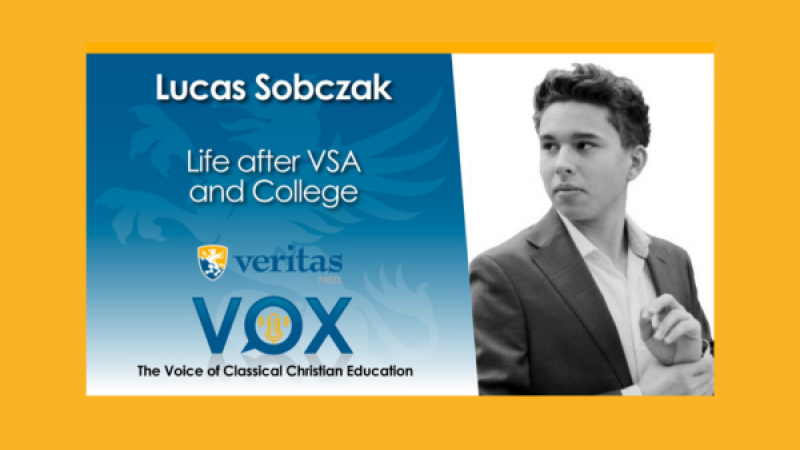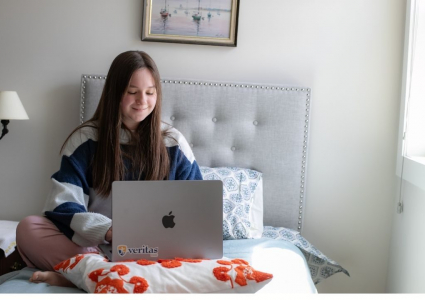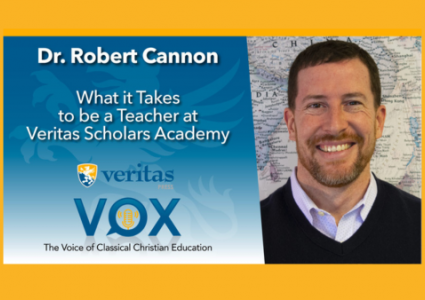Life After VSA and College | Lucas Sobczak

Listen on Apple Podcasts | Listen on Spotify | Watch the Video
Want to know what a recent Veritas Scholars Academy graduate thinks of his VSA experience and how it prepared him for college at Liberty University? Listen to Lucas Sobczak tell his story on today’s podcast!
Episode Transcription
Note: This transcription may vary from the words used in the original episode for better readability.
Marlin Detweiler
Hello again. You are joining us for another episode of Veritas Vox, the voice of classical Christian education. Today we have with us, Lucas and Lucas. It's been a long time since I've said your last name. I'm going to ask you to help me.
Lucas Sobczak
Sub-check!
Marlin Detweiler
Lucas is with us as a VSA Veritas Scholars Academy alum who is currently in college. But I will let him tell us a little bit about himself. So do– maybe how we got connected. But starting with really how you how long and what got you connected at VSA? And when you graduated, that sort of thing.
Lucas Sobczak
So I first heard about VSA through a friend of mine. We had done Classical Conversations, and we kind of knew that whole classical education side from, like the co-op stuff. And then he pulled out to VSA, specifically about Omnibus, because at the time and still I absolutely love history, all the reading and everything. So it's basically Omnibus.
And so he told me about it, and funny enough, he told me about Primary and Secondary, like “Now I want to Primary. I just want the best!” not knowing about primary sources and secondary sources and what that meant. So I did Omnibus Primary first every year with Mr. Piper, and that was an awful lot. It definitely threw me in the deep end, which is the amount of reading. I don't think I've read so many pages per day in my life! And so that was a big shock, but definitely worth it. Read some of my favorite books, like Heroditis and a couple of others. But yes, that's how I got started. And then that year, I did Omni I with the Florida Virtual School, which is kind of like a online public school system here in Florida.
Marlin Detweiler
And Florida Virtual is one of the oldest online schools and one of the earliest public schools online.
Lucas Sobczak
Yeah, No, it's it did serve that purpose virtually for the way I got to know about it was through a soccer school that we play soccer in the morning and I do FVS in the afternoon. So after Omni I and FVS I went full time with Veritas, probably eighth grade and then went through high school, did the Diploma Program, and then graduated ‘22. That's kind of the short version. I guess if you want me to go into detail on that.
Marlin Detweiler
Well, I'll ask you some questions. So where are you now?
Lucas Sobczak
So, I'm a sophomore at Liberty University, studying finance and minoring in real estate.
Marlin Detweiler
Okay, so you left– you finished with VSA and went on to Liberty. You're in your sophomore year. Tell us, as you got into being a full-time student at Veritas, what were the things that you liked? What were the things you didn't like?
Lucas Sobczak
Honestly, I liked Omnibus. It’s probably just the best thing for me about it is coming from, you know, my interest. So that was definitely something I absolutely love. I really enjoyed the professors. Mr. Harhoff, that's a classic. Mr. Piper. Mr. Shearer, Mr. Turnbull, there's mostly the, the Omnibus professors, no offense to the math professors. I just that wasn't my forte, but that was something I really enjoyed.
I also enjoyed the community, which I know there is community on an online high school, but it took me a couple of years, probably junior year, when I kind of got into it to kind of get adjusted to kind of the online environment in terms of the social aspect. And I'm not saying that the social and kind of in-person interactions are the same things or not, but I had in-person kind of interactions through soccer. I played for 15 years ish, maybe more.
Marlin Detweiler
Are you playing?
Lucas Sobczak
No, I tore my hamstring freshman year of high school. That put me– I'm I'm playing intermurals but that's not the same thing.
Marlin Detweiler
Yeah, it's not, is it?
Lucas Sobczak
Yeah, but I think that I also enjoy the social aspect. And then I really wasn't coming from homeschooling through most of my life I didn't really have that like, you know, high school experience in terms of the interactions. I mean, I was always pretty social, but I enjoyed the whole school education. So, to me, I wasn't really missing much.
I mean, I still, my friends through soccer or through church, through other activities. So that wasn't a big aspect to me as it might be to someone else. Really starting there. There wasn't than many cons. There were just a lot of pros.
Marlin Detweiler
Yeah, through this process, we got connected more than I generally get to get connected with students– tell our listeners how you and I got connected.
Lucas Sobczak
So that first interaction with Mr. Detweler I has was at my first EOYG- End of Year Gathering in Lancaster; you photobombed a picture my brother and I were taking of the the graduation ceremony! So that was the first ever interaction I had with you. And then I got the first proper introduction, I think was at my graduation after the ceremony, you kind of went up to you start talking about like pastor who you met through C12.
Marlin Detweiler
He and I were at a meeting. C12, for the people that don't know, is Christian CEOs getting together on a monthly basis; roughly 12 of them to go through some curriculum and discuss various topics. And he and I ended up seated next to each other when I was a visiting member of an Orlando, Florida based group.
Lucas Sobczak
Yeah, he- it took me to a meeting, and as an aspiring business leader, hopefully, it was it was amazing to see, you know, the Christian environment. But like the straight like no business, like no sugarcoating business environment with like a Christian spin on it. That was just really cool to see firsthand. And then I introduced myself. We're talking about like pastor, I think I mentioned my senior thesis and then we had a call after that, several calls after that. But that was like the first really real introduction.
Marlin Detweiler
But you know what was enjoyable to me, too, and resonated with you is that you were interested in the real estate investment field, which was my career area before Veritas became a thing, and it caused me to really change careers. So talk to us a little bit about your plans after college.
Lucas Sobczak
So things after college kind of go in reverse. I know what I want to do and end goal. Getting there is the problem. Year by year, I'm kind of sorting that out. At one point, I thought I wanted to be a wealth management or or an accountant or financial advisor, but I think I figured more toward real estate as a more sensible kind of vehicle. And I was through my freshman year of college, just some experiences both involved and steered me towards real estate, not because I don't like stocks, but because I just realized like my real, real passion is real estate. So I –you connected me with I'm blanking on, on this last name, but. Adam…
Marlin Detweiler
Adam Michaelson.
Lucas Sobczak
Adam Michaelson! Yeah. So he knew– you put me in touch with him and we connected because last year, actually. Right at the beginning of school year– right before I left, I think everything was packed this side of the camera. And so we spoke, and he said to get together. What's your break? And I'm meeting him on the fourth in January to talk about the internship. And then one of the things I do want to do, which is actually something you told me about, was the way I am, which the market to research about it and about people like Adam and people at my school. I look at it like, yeah, that's, that's something you should definitely do, especially going into commercial real estate.
Marlin Detweiler
Yeah, well, what was, what was fun for me was to be able to introduce you to Adam. I actually knew his father, who was the founder of this real estate investment firm in Orlando, and Adam is now the son that is running things. And it was fun for me to be able to introduce you to them and have to say very little about you, knowing that you were perfectly capable of carrying your own introduction and selling yourself, so to speak.
And it very quickly turned into they were interested in having you join them in an internship, and it sounds to me like a discussion is going to happen in the next few weeks about what that might look like. And so maybe it hasn't shaped up much yet, but my encouragement and my ability to make that connection for you was really encouraged by what I knew you were capable of from how you've comported, how you've presented yourself in our interactions.
And from what I've know candidly about the education that you've gotten and you really have been able to communicate well to to win them very quickly. And that and that's really fun to see. What do you think maybe in your education was key to being able to help them believe that, as an intern, you were a good use of their time?
Lucas Sobczak
So it's funny you mentioned that– I was telling my mom- there’s somethign Liberty has done, it started I think it was last year; it's called the CEO Summit and they bring in hundreds of young and mostly Christian CEOs from large companies. And I was able to sit down with someone who was involved in commercial real estate based in central Virginia, and he was asking me what my strengths are. And I said, just seeing patterns, being able to connect dots. And I think that was something I always kind of enjoyed, just kind of being able to talk a lot about many different things and being able to connect certain aspects to that from one interest to another interest. And I think again, Omnibus really helped me connect those things, whether, you know, reading ancient political thought to modern literature, talk about dystopian recent literature, 1984, Animal Farm and just being able to connect books from different millennia and being connect those and see different perspectives. Yes, you may not be able to apply Jane Austen to real estate, but you kind of have the background and the instincts. She connects very different ideas together, and that's something I love doing and probably– I can't speak for them, but I think that's what my strength is that I try to put out is being a big picture. But being able to get into the details and find details that I could pull out.
Marlin Detweiler
So this is an intriguing thing to pursue. But how does an interest in the great books connect to a career desire in real estate? How do you see that connecting? I know you're thoughtful. I know you've given that some thought, but I, I think that it isn't as immediately known to people how that might be. Talked to us about it.
Lucas Sobczak
So the process of academia that I've taken, I guess maybe you can say that. From a very early age in history, just reading, reading history books, needing to put them on a map so you get into geography, learning about geopolitics, learning about politics, and a joke that I heard is that you never see a poor politician so obviously then leading into business. So I guess in the back then you can go from three to business.
But then if you look at the Great Book, I think there is– there's always an aspect of… there's always like a drive behind certain things. And a lot of times with money, but I think it's a of value. So if you look at like a great book that I read, it's about Bitcoin, but they she talks about the time value of money. So if a society has a low time value of money, they're going to be trying to things that are very quick and easy and not thinking long term. And so when you have a high time value of money, you're able to invest back into the stock market or for one day, whatever that may be. But then you also invest into your long term projects, whether it's a large cathedral or a large painting.
So if you look at the value from history, the majority of them have high time value, a higher value of time. I should say though, when you read those, you kind of get the understanding of, yeah, I'm kind of valuable over the long term. So it was a roundabout answer would be being these being the value of time through time I think is a way to see it like a visit where you kind of have that, that, that time is precious.
Marlin Detweiler
Interesting. So if I can paraphrase that you see the enduring works, and they're not only that the ideas have stood the test of time, but that they're there's a conversation about the idea of thinking in broader, longer term categories and real estate naturally connects to that as a durable asset, as an asset that from a pure calculation standpoint, the investment value of an investment piece real estate is is calculated over years, not typically weeks or months, as some things are. And so all of those things kind of conspire together. Is that a fair assessment? Fair summary?
Lucas Sobczak
Yeah. I think there's the best way to sum it up is I'm reading Atlas Shrugged right now, by Ayn Rand and I’m at a point of the book where the kind of the thought leaders of the world are talking. And it's a bunch of absolute nonsense. There's someone who's saying that books should not sell more than 10,000 copies and that men are illogical, worthless creatures. And so you see very low time value in that. And so they're saying, the path is not the path is illogical. They didn't value true human nature, but that's what got them to the present. So I think when you look at that, it's like if you don't respect the human value, you're going to get worthless junk. But if you do, like in the great books where they put so much effort into a book, and then you get that value over time, which you invest now in real estate, hopefully appreciates over time.
Marlin Detweiler
Yeah, yeah. This isn't where I was going to go and I don't want to put you on the spot in a in a bad way, but you've gone to a university that champions in some sense, as I understand it, and feel free to correct me if I'm wrong, but champion's a bit that Jesus may come back today, but is certainly coming back soon, so the long term may not matter. How would you address that? Is that is that a fair assessment of where you go to college?
Lucas Sobczak
I would say… I would say no.
Marlin Detweiler
Good!
Lucas Sobczak
I would say that I can definitely see where some of the extreme, extreme, extreme, you know, charismatic evangelical gospel can show that. But I definitely don't think that in my perspective as a student there that they they talk about that. I think they talk about especially coming from school of business. They talk about, you know, investing out, being good stewards of your time and your value.
Marlin Detweiler
So at least within the business school, maybe it's the school of management. I don't know what they call it there. They vary a little bit from college to college, but you see them valuing long-term consideration.
Lucas Sobczak
For sure! There's there's there's a standard of quality and loyalty that– there was Jerry Farwell Senior who started school here, I think I never heard him speak, but there's a lot of talking always about doing things right. They play a lot of videos of him through their education and he's always talking about doing the right thing for the long term, kind of establishing, you know, a great school, the champions for Christ that they want to like very much think that this whole the whole is is long term thinking.
Marlin Detweiler
Interesting. Let me change the subject here for a moment. I'm so– well in bringing closure to this. I'm so excited to have been able to introduce you and look to an internship possibility. And I can't tell you how much it is a joy to me to be able to help our students that way beyond high school. Like what might happen here and really could help you a good bit as you consider career possibilities.
So that's been that's been fun for me to I don't think that you're the only one big blessed by that. I am as well. It's it's really fun to be able to do that. But I'd like to hear you talk a little bit now as a college student and what how well-prepared you were from the education you got at VSA
Lucas Sobczak
So I would say that I was not well prepared because in a very specific sense that VSA has you write very, very complex, deep thinking essays and from a very broad prompt. So going to liberty, it can be very hard sometimes to write an essay that requires very few words, a lot of sources, and a very hyper specific prompt.
Marlin Detweiler
So that's interesting!
Lucas Sobczak
Yeah. So overall, I think VSA prepared me very well, but I think in terms of the writing style was very different. So to me that was a challenge adjusting to that shift. But as a whole, I very much think that VSA prepared me well for the for the college life. It was a lot of time management which every VSAer will know that you need to manage your reading or your the amount of math that you need to do each day to keep up with homework. And there's that aspect of it which kind of came naturally as a VSA student and there is there's almost a sense that they're just very different. It's a very it's a culture shock, really, I’d say. But being able to adjust to that quickly, I think would be a lot easier than maybe a public schooler coming to the classical education. It’s very different and I didn't find it much of a challenge as I thought it would be, but it was still a challenge. I would say that.
Marlin Detweiler
Okay, what might you recommend to us to help your preparation for what you have experienced? In other words, what might we have done differently to make you more ready? Was it was it as simple as I have to learn to write in a certain way that I didn't practice much in school? Or is it more complicated than that?
Lucas Sobczak
No, although I said a joke about being able to write differently, but being able to write the way that VSA teaches you does help you to write out very hyper specific, you know, every word count. Like if you need to write a 200 word paragraph about Christian worldview using five sources, a little exaggeration…
Marlin Detweiler
They would be tough!
Lucas Sobczak
Yeah. So maybe, maybe three resources would be more accurate! But being able to write from VSA, you know, everywhere. You need to be very thoughtful of, you know, a very limited amount of words. So in that sense, the writing style does help. You just need a certain thing.
The only thing I can think of is maybe the name of the college itself, which is the college prep, because going into college I felt fine it's maybe that that in between or, you know, where you're applying to or things like that because, I mean, this is just a personal thing. Like I, I never thought I was going to go to Christian college, but it that's how it lined up and I wouldn’t change it. But the college prep perhaps could- I don't know is very, very new to the person.
Marlin Detweiler
Yeah, say that again. Very easy to what?
Lucas Sobczak
Very unique to each person.
Marlin Detweiler
Yeah. Yeah. Very good. Do you, do you expect after college to jump right into a real estate investment career.
Lucas Sobczak
That's the plan. Yeah, that's the, that's the plan. Unless something changes or I change my major, which I've already changed that way too many times. But. Yeah!
Marlin Detweiler
Well, that's exciting. I know it is– it's fun for me to talk not only to you as a VSA graduate, where we have a lot of knowledge in common about what your education was. But what's really been fun for me over the couple of years that we've known each other is just to hear you talk about your plans, both knowing where you want to go, but also knowing that they could change. Very few young men in your position are certain about what they plan to do, which helps in providing direction or as ready to accept the fact that God may take you in a different direction or even your interests may change and take you in a different direction. I find that balance very refreshing and I expect if I knew that we would have lots and lots of students like you in that regard who are really prepared to meet the challenges of life after high school and of course, life after college as well. Lucas, thank you so much for joining us. Anything you want to say in closing?
Lucas Sobczak
For for all the students listening, don't let Senoritis hit too hard. For all the parents listening, I guess just… VSA isn’t Omnibus, but I think that Omnibus is still relates to everything where you talk about Pythagoras in math you can relate that to Aristotle. So I think VSA, people can replicate VSA, but people can't replicate Omnibus. And so I think that that would be my lesson. That's great.
Marlin Detweiler
Well, thank you so much, folks. Thank you for joining us for this edition of Veritas Vox, the voice of classical Christian education. Take care.







